
In 97% of cases, corrupt officials receive only a fine
More than 2,000 court decisions against corrupt officials have already been issued this year, according to the Unified State Register of Persons Who Committed Corruption or Corruption-Related Offenses. This is 37% more than last year, but still less than before the start of the great war. In 97% of cases, corrupt officials get off with a fine. And the most common offense is violation of financial control: officials either fail to file declarations or file them with errors.
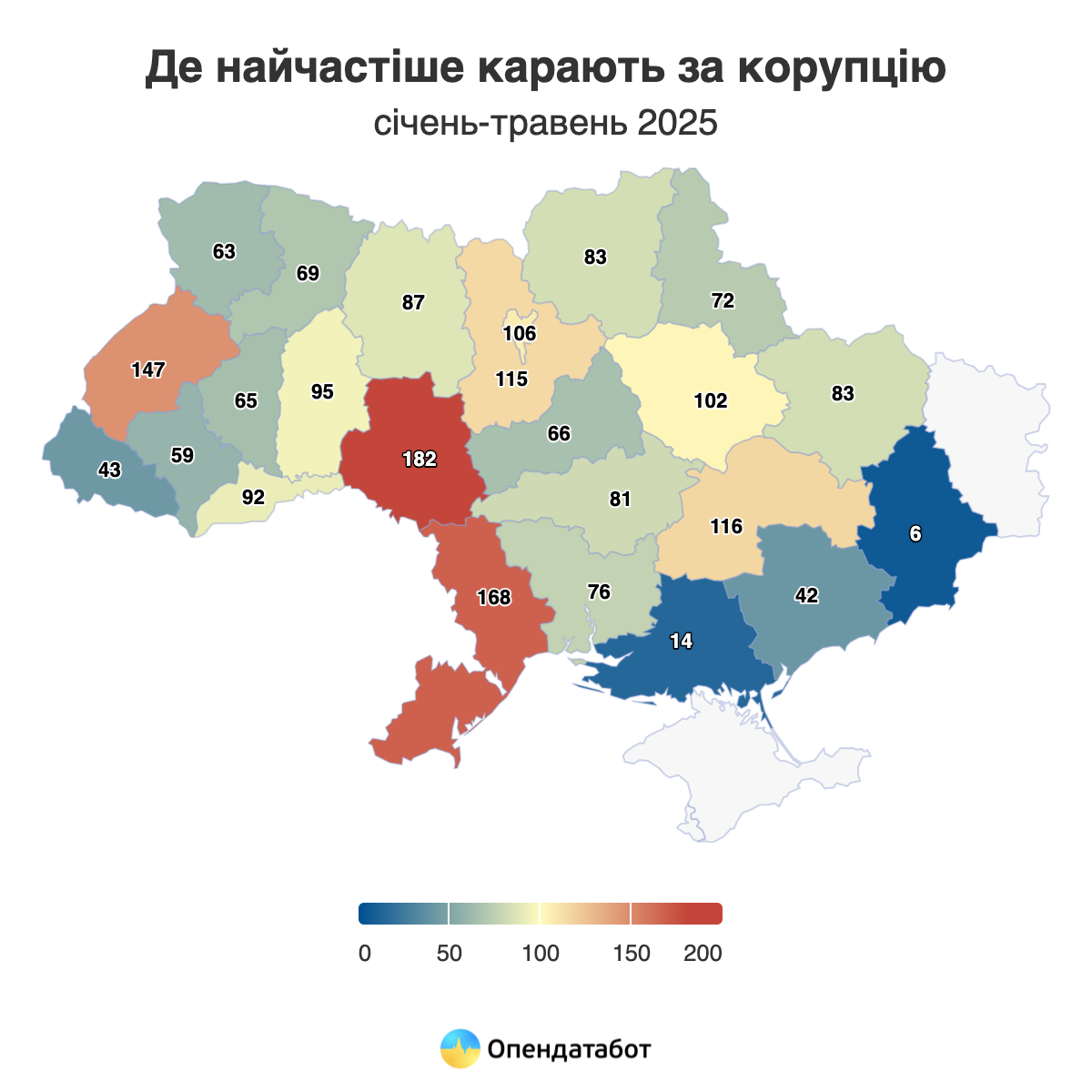
In the first five months of 2025, 2032 decisions were made by courts in corruption cases. The number of decisions increased by 37% over the year. However, this is still less than in the same period in 2021.
The number of decisions has been gradually increasing after a large decline following the start of the full-scale campaign in 2022-2023. Back then, filing declarations was optional and deferred, and the annual number of decisions decreased by almost three times. Almost 5,000 decisions were issued by the courts after the mandatory filing of declarations was reintroduced in 2024. By the way, declarations for previous years had to be filed then as well, if they had not been done before.
Courts in Vinnytsia region are the most active in punishing corruption offenses – they have already issued 182 decisions, which is 9% of the total. This is followed by Odesa (168), the leader of previous years – Lviv (147), as well as Dnipro (116) and Kyiv (115) regions.
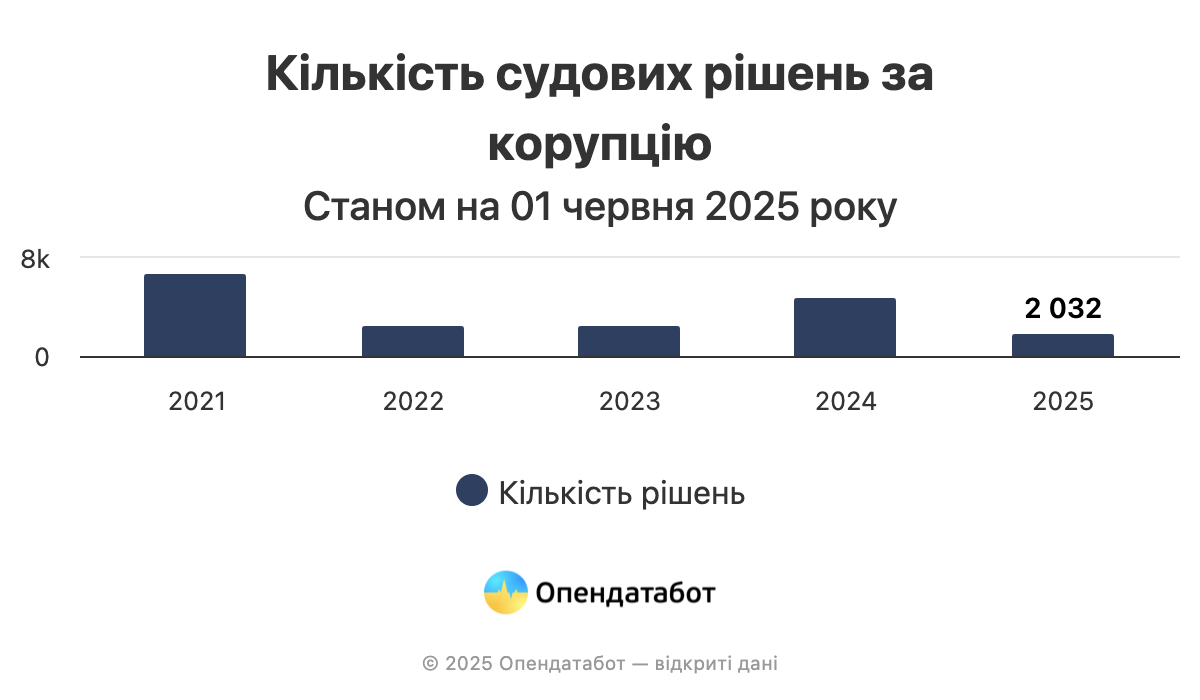
More than 73% of all decisions this year relate to violations of financial control requirements – 1487. In other words, officials do not submit or submit their declarations with violations. Over the year, the number of such decisions has increased 5 times – probably, declarations accumulated in previous periods were checked. Instead, the number of decisions on bribery almost halved to 347. And the courts punish violations related to conflicts of interest almost 80% less often. This year, it is only 70 decisions.
In the overwhelming majority of cases – 97% – corrupt officials are fined. Only 44 people received actual prison terms. The amount of fines depends on the violation and varies considerably: from 850 UAH to 680 thousand UAH. The same applies to prison terms for corruption: from 1 to 10 years.
So far this year, the largest fine has been imposed on a graduate student of a music academy in Kyiv who offered foreign students assistance with admission, training, and thesis defense for a fee. He was fined UAH 680,000 for this.
At the same time, a military serviceman in Sumy region received the longest prison term for corruption. The sergeant was responsible for logistics and, having received a night vision device and a thermal imager for his report, decided to misappropriate it and then sell it. For this, the court sentenced him to 10 years in prison.
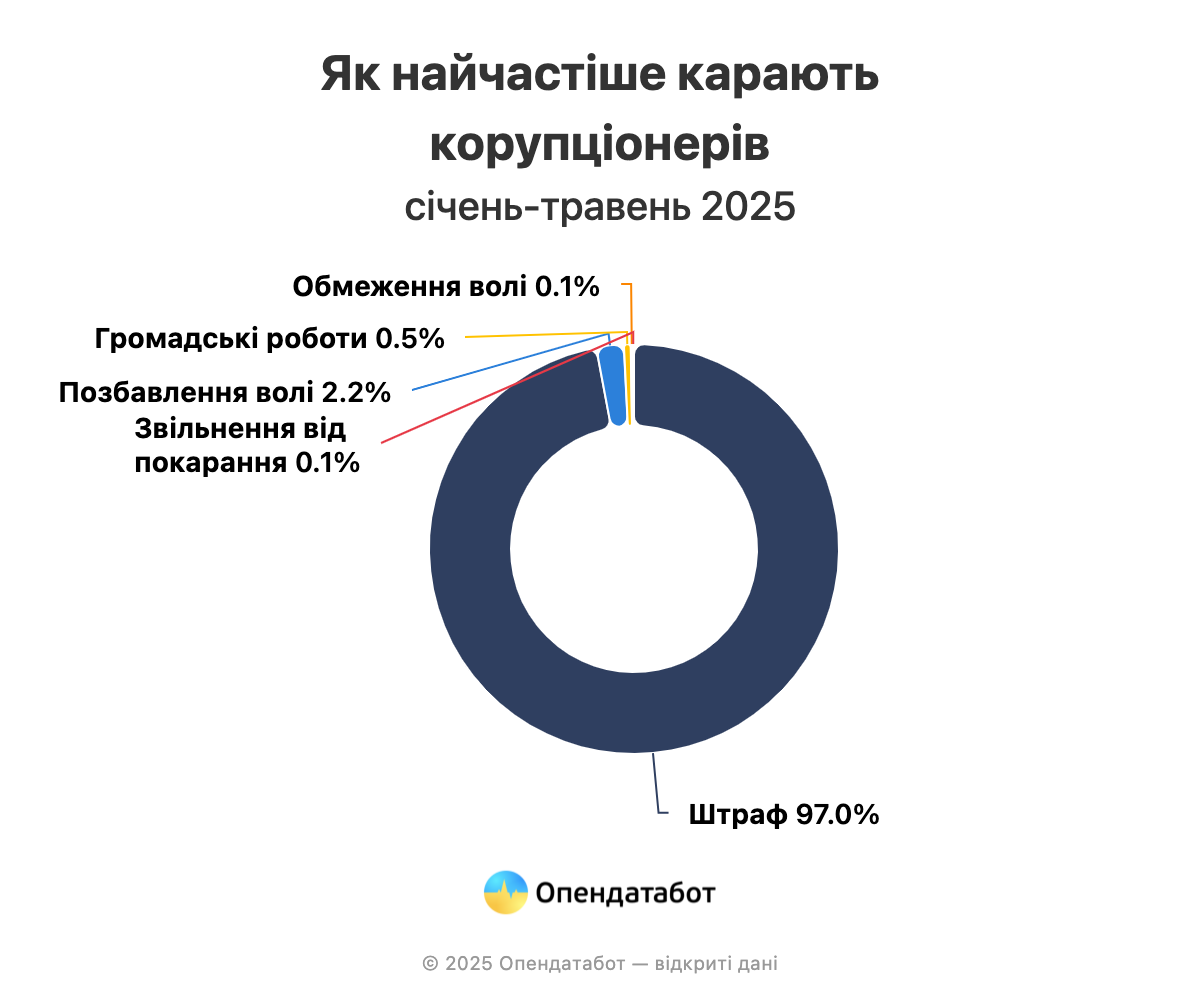
It is worth noting that a person who enters the Corrupt Practices Register is entered there for life. However, there are several grounds for removing data from the registry:
In other cases, a person’s data will remain in the Register forever, even if it is a minor violation, such as that of a civil servant who once filed a late declaration.
However, recently, the European Court of Human Rights (ECHR) in the case of Sytnyk v. Ukraine, application No. 16497/20 of April 24, 2025, made a resonant decision in favor of the applicant and found Ukraine guilty of violating human rights. Thus, the court ruled that the applicant’s lifelong inclusion in the Corrupt Practices Register and the “labeling of a corrupt official” in this case constituted an interference with his right to respect for private life: it damaged his professional and public reputation, undermined confidence in his professional efforts and achievements, and called into question his moral values.
Currently, the President is signing a draft law that would limit the stay of officials with administrative offenses related to corruption in the Register of Corrupt Officials for 1 year.

JSC Ukrenergomashiny (Kharkiv), more than 75.22% of which is owned by the state, will pay dividends to shareholders for 2024 in the amount of UAH 660.66 thousand (75% of the net profit) from 1 to 28 October this year at the rate of UAH 0.00156 per share with a par value of UAH 0.25.
According to the information in the NSSMC’s information disclosure system, the relevant decision was made by the general meeting of shareholders on April 28, and on June 27, the supervisory board approved the procedure and term for their payment.
As reported, in 2024, the company more than doubled its net sales revenue compared to 2023 to almost UAH 799 million and received UAH 0.88 million in net profit compared to UAH 0.2 million in 2023.
At the end of 2023, Ukrenergomashiny allocated UAH 162.23 thousand (80% of the net profit in accordance with the government-approved standard) for dividends at the rate of UAH 0.00038 per share.
In addition to the state, the company’s shareholders (according to the NSSMC as of the first quarter of 2025) include the Seventh Investment Fund, which is affiliated with entrepreneur Kostyantyn Hryhoryshyn and managed by AMC Svarog Asset Management, with 15.3416% of shares, and non-resident Valeriy Valandin with 5.598% of shares.
JSC Ukrenergomashiny (formerly JSC Turboatom and Electrotyazhmash) is the only Ukrainian manufacturer of turbine equipment for hydro, thermal and nuclear power plants. The company also produces electric motors for railway and municipal transport (Electrotyazhmash’s nomenclature).
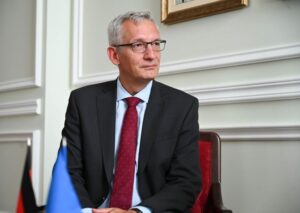
Former State Secretary for Financial Affairs and experienced diplomat Heiko Thoms will become Germany’s ambassador to Ukraine, replacing Martin Eger, who will now head the Federal Intelligence Service, Die Welt reported on Tuesday.
“Former State Secretary for Financial Affairs Heiko Thoms will represent Germany as ambassador to Ukraine in the future… The cabinet is expected to approve the appointment on Wednesday,” the publication said on its website.
Until this year’s government change, Thoms was State Secretary in the Federal Ministry of Finance.
He will replace Martin Eger, who will become the new head of the Federal Intelligence Service (BND). Eger also received Foreign Minister Johann Wazewsky during his visit to Ukraine this week.
According to reports, the 57-year-old Toms is an experienced diplomat. From 2020 to 2023, he was Germany’s ambassador to Brazil, and before that, he was deputy head of the German mission to NATO.
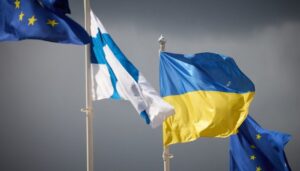
The European Investment Fund (EIF), a member of the European Investment Bank (EIB) group, and Finland’s official export credit agency, Finnvera, have signed a EUR 30 million guarantee agreement to support exports of Finnish small and medium-sized enterprises (SMEs) to Ukraine.
According to the European Commission, the pilot project was signed under the InvestEU program and is part of the EU’s broader efforts to strengthen economic ties with Ukraine and support its recovery and accession process.
“The agreement allows Finnvera to issue export credit facilities to Finnish companies trading with Ukraine under the EIF guarantee under the InvestEU export credit guarantee facility. This is one of 13 agreements being prepared with national export credit agencies in EU member states under this mechanism,” the European Commission said in a statement on its website on Tuesday.
It is noted that the pilot project will support Finnish SMEs and medium-sized companies with fewer than 500 employees to help manage risks and access new opportunities in Ukraine, even in times of war. The EIF guarantee complements the national loss-sharing mechanism introduced by the Finnish Ministry of Economic Affairs and Employment, which allows Finnvera to issue export guarantees to Ukraine under exceptional conditions.
“I welcome this agreement… Thanks to the support of the EU budget and the EIF, the export program helps EU companies to continue trading and strengthen our economic ties with Ukraine. In this way, it contributes to the further integration of the EU and Ukrainian economies, as well as to Ukraine’s recovery. I hope that more deals will be concluded through this program in the near future, benefiting both EU businesses and the Ukrainian economy,” commented Valdis Dombrovskis, Commissioner for Economic and Productivity, Implementation and Simplification.
EIF Executive Director Marjut Falkstedt noted that the fund had made significant efforts to launch this program quickly, recognizing its potential to strengthen EU SMEs and support Ukraine’s economic stability at a critical time. She noted that the introduction of the guarantee is an important step, and similar agreements in other EU countries will further extend its impact.
In addition, according to Finnvera’s CEO, it is extremely important from the export credit agency’s point of view that it is possible to support Ukraine’s recovery efforts while creating opportunities for Finnish companies.

In April 2025, Ukrainian banks issued 458 mortgage loans in the amount of UAH 834.8 million, which is 5.1% more than in March, when 427 loans were issued for UAH 689.4 million, according to the results of a monthly survey by the National Bank of Ukraine (NBU).
“The quality of the mortgage portfolio is good: the share of non-performing loans remains at 15%,” the NBU commented on the results.
According to the central bank, the volume of loans issued has almost halved compared to April 2024. According to the NBU, out of 38 banks surveyed, 11 financial institutions issued mortgage loans in March. Most of the deals were made in the primary housing market: 261 in April for the amount of UAH 492.2 million, compared to 232 in February for the amount of UAH 436.5 million. On the secondary housing market, 197 transactions were concluded for UAH 342.5 million, while in March the number of transactions amounted to 195 for a total amount of UAH 358.1 million.
The weighted average effective interest rate in April did not actually increase to 8.01% p.a. from 8.00% in February.
The survey data show that most loans were issued in Kyiv and Kyiv region in April – 259 for UAH 511.9 million (34.5% of the total volume). They are followed by: Lviv region – 26 loans worth UAH 48.8 million, Ivano-Frankivsk region – 17 loans worth UAH 30.8 million, and Dnipropetrovs’k region – 16 loans worth UAH 28.9 million.
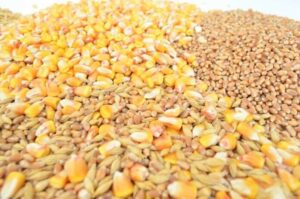
As of July 1, 2024-2025 marketing year (July-June), Ukraine exported 40.499 mln tonnes of grains and pulses, of which 2.217 mln tonnes were shipped in June, the press service of the Ministry of Agrarian Policy and Food reported, citing data from the State Customs Service.
According to the report, as of June 28 last year, the total shipments were estimated at 50.553 million tons, including 3.621 million tons in June.
According to the preliminary estimates, in 2024/25 season, Ukraine exported 15.704 mln tonnes of wheat (18.3 mln tonnes in 2023/24 MY), 2.318 mln tonnes of barley (2.477 mln tonnes), 10.8 thsd tonnes of rye (1.6 thsd tonnes), and 21.788 mln tonnes of corn (29.233 mln tonnes).
The total exports of Ukrainian flour in 2024/25 MY are estimated at 70.4 thsd tonnes (in 2023/24 MY – 97.8 thsd tonnes), including 65.8 thsd tonnes of wheat (92.4 thsd tonnes).
Thus, in the season-2024/25, the grain exports were down by 19.9% in general, by 14.2% for wheat, by 6.4% for barley, by 25.5% for corn, by 28.1% for flour, including 28.8% for wheat. At the same time, in 2024/25 MY Ukraine increased rye exports by 6.8 times.
As reported, in the season-24/25, the domestic market faced the deficit of rye. Flour mills and bakeries started importing it in winter 2025. The main countries supplying rye and rye flour to Ukraine are the Baltic states and Poland. Industry associations predict that in 2025/26 MY Ukraine will face a 100% deficit of rye due to the further reduction of the production area under this crop. According to experts, this will lead to a 20% rise in bread prices.